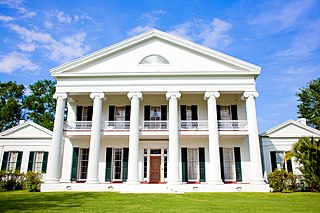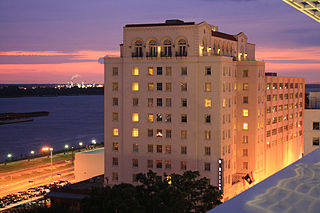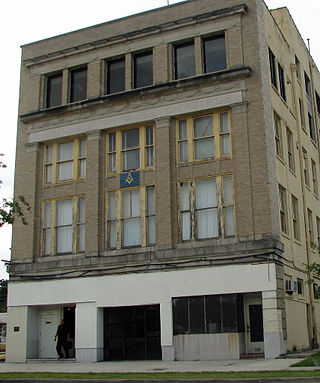
Baton Rouge National Cemetery is a United States National Cemetery located in East Baton Rouge Parish, in the city of Baton Rouge, Louisiana. It encompasses 7.7 acres (3.1 ha), and as of 2020, had over 5,000 interments.

Beauregard Town, also known as Beauregard Town Historic District, is a historic district in downtown Baton Rouge, Louisiana, anchored by Government Street. It was commissioned in 1806 by Elias Beauregard, and was listed on the National Register of Historic Places in 1980. It is the second-oldest neighborhood in Baton Rouge.

Madewood Plantation House, also known as Madewood, is a former sugarcane plantation house on Bayou Lafourche, near Napoleonville, Louisiana. It is located approximately two miles east of Napoleonville on Louisiana Highway 308. A National Historic Landmark, the 1846 house is architecturally significant as the first major work of Henry Howard, and as one of the finest Greek Revival plantation houses in the American South.

The Old Louisiana State Capitol, also known as the State House, is a historic government building, and now a museum, at 100 North Boulevard in Baton Rouge, Louisiana, U.S. It housed the Louisiana State Legislature from the mid-19th century until the current capitol tower building was constructed from 1929-32.

Baton Rouge station is a historic train station located at 100 South River Road in downtown Baton Rouge, Louisiana. It was built for the Yazoo and Mississippi Valley Railroad which got absorbed by the Illinois Central Railroad. The station was a stop on the Y&MV main line between Memphis, Tennessee and New Orleans, Louisiana. The building now houses the Louisiana Art and Science Museum.

The Old Louisiana Governor's Mansion is located at 502 North Blvd. between Royal and St. Charles Streets in Baton Rouge and was used as Louisiana's official gubernatorial residence between 1930 and 1963; a new residence was completed in 1963. The Old Governor's Mansion was built under the governorship of Huey Long, its first resident. The building is reported to be inspired by the White House in Washington D.C. as it was originally designed by Thomas Jefferson. It is said that Long wanted to be familiar with the White House when he became president, so he had the White House duplicated in Baton Rouge. Some dispute this legend and simply say that the building is merely a fine example of a Georgian-style mansion.

The Magnolia Mound Plantation House is a French Creole house constructed in 1791 near the Mississippi River in Baton Rouge, Louisiana. Many period documents refer to the plantation as Mount Magnolia. The house and several original outbuildings on the grounds of Magnolia Mound Plantation are examples of the vernacular architectural influences of early settlers from France and the West Indies. The complex is owned by the city of Baton Rouge and maintained by its Recreation Commission (BREC). It is located approximately one mile south of downtown.
City Park Golf Course is a public golf course in Baton Rouge, Louisiana, and was the first public golf course and the city's only public course until the mid-1950s. The short, 34-par, nine-hole course was completed in 1926 and officially opened in 1928.

This is a list of the National Register of Historic Places listings in East Baton Rouge Parish, Louisiana.

The Hilton Baton Rouge Capitol Center is a historic hotel in Baton Rouge, Louisiana, originally built in 1927 as the Heidelberg Hotel. It was listed on the National Register of Historic Places in 1982. The Heidelberg Hotel was a favorite dwelling of Louisiana Governor Huey Long, who had a fourth-floor suite. For a time it was known as the Capitol House Hotel, when under the management of former State Representative Chris Faser, Jr. Huey P. Long, John F. Kennedy, Hubert Humphrey, Jimmy Carter, Will Rogers, and Fidel Castro were all guests of the hotel.

Longwood is a plantation located at 15417 River Road in East Baton Rouge Parish, Louisiana, which was listed on National Register of Historic Places in 1983. Directly across the street is a levee holding back the Mississippi River.

Mount Hope Plantation House is a historic plantation house located at 8151 Highland Road in Baton Rouge, Louisiana.

Bayside is plantation comprising a historic plantation house built in 1850 by Francis DuBose Richardson on the Bayou Teche near Jeanerette, Louisiana, United States. Richardson, a classmate and friend of Edgar Allan Poe, purchased the land for a sugar plantation.

The Prince Hall Masonic Temple is a historic building located at 1335 North Boulevard in Baton Rouge, Louisiana.

St. Joseph Cathedral is a Catholic cathedral located in downtown Baton Rouge, Louisiana, United States. It is the mother church of the Diocese of Baton Rouge, and it was listed on the National Register of Historic Places on March 22, 1990.

The Reiley-Reeves House is a historic house located in the Garden District of Baton Rouge, Louisiana, at 810 Park Avenue.

The Baton Rouge City Club, also known as the Old Post Office, is a historic three-story building at 355 North Blvd in Baton Rouge, Louisiana. It was built in 1895 as a U.S. post office building.
The Asphodel Plantation is a historic building and former plantation, completed in c.1830 and located about 3.5 miles (5.6 km) south of Jackson, Louisiana, United States. It was built by Benjamin Kendrick, a cotton planter and slave owner.

The Poplar Grove Plantation, also once known as Popular Grove Plant and Refining Company, is a historic building, site and cemetery, the plantation is from the 1820s and the manor house was built in 1884, located in Port Allen in West Baton Rouge Parish, Louisiana, United States. The site served as a sugar plantation worked by enslaved African Americans, starting in the 1820s by James McCalop. Starting in 1903, the site was owned by the Wilkinson family for many generations.






















